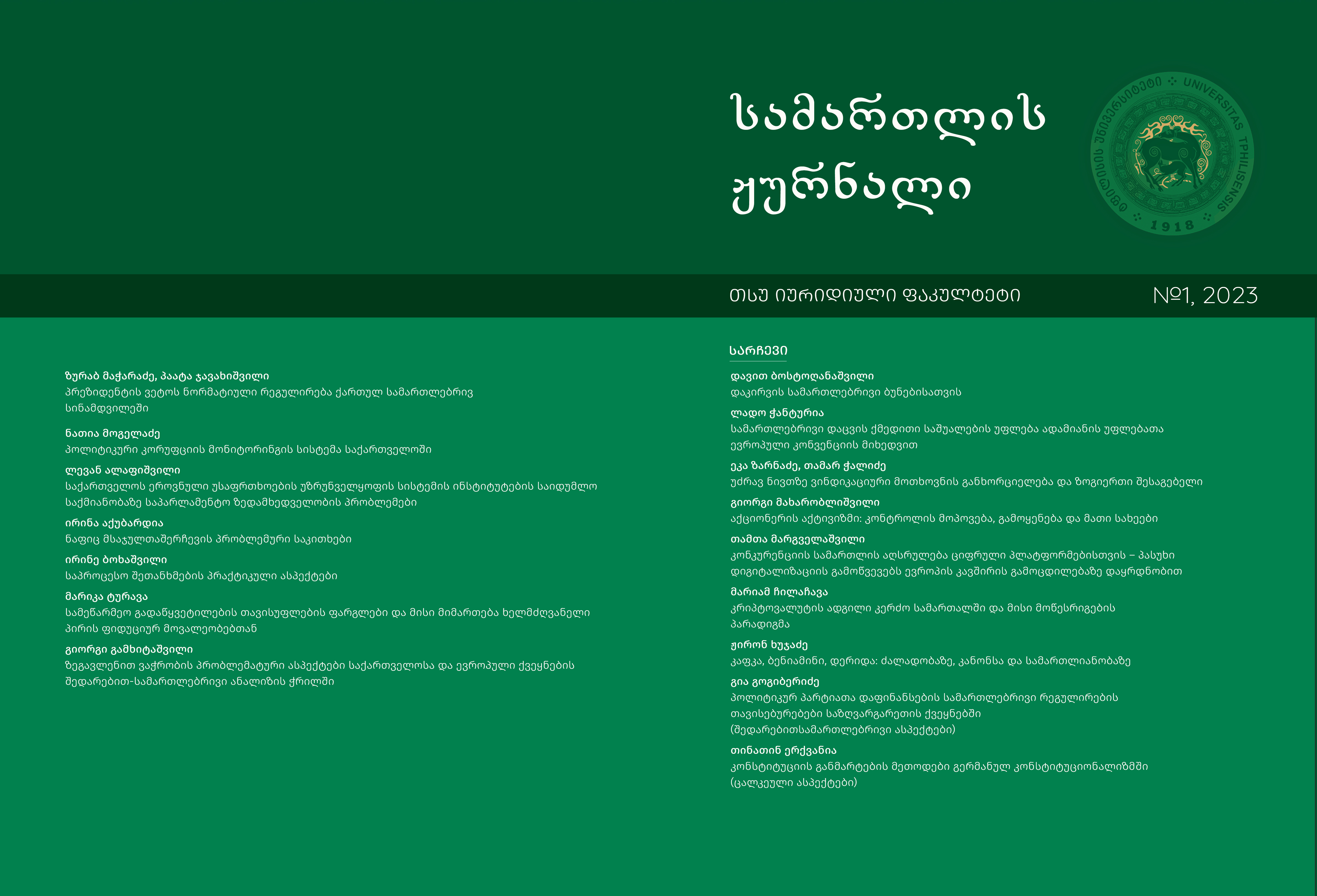კაფკა, ბენიამინი, დერიდა: ძალადობაზე, კანონსა და სამართლიანობაზე
DOI:
https://doi.org/10.60131/jlaw.1.2023.7065საკვანძო სიტყვები:
კაფკა, ბენიამინი, დერიდა, კანონის წინაშე, სწავლება, ძალადობა, სამართალი, სამართლიანობა, დეკონსტრუქცია.ანოტაცია
კაფკას იგავი „კანონის წინაშე“ გვიყვება ერთ სოფლელ კაცზე, რომელიც მთელ ცხოვრებას კანონის კარის წინ ატარებს და ამაოდ ცდილობს მასში შესვლას. მთავარი კითხვა, რომლის პასუხების ძიებასაც ეძღვნება სტატია, ასე გამოითქმება: რატომ ვერ აღწევს სოფლელი საწადელს? კითხვის ჩამოყალიბება უკვე ინტერპრეტაციაა, რომელიც კაფკას სამყაროში არ სრულდება „ამოხსნით“. „ამოუხსნელის“ ფილოსოფოსები კი ვალტერ ბენიამინი და ჟაკ დერიდა არიან. ისინი კითხულობენ კაფკას (მის ლიტერატურასა და მის პიროვნებას) და ეხმარებიან კაცს სოფლიდან, რაც იმ კავშირებისა და მიმართებების გაანალიზებას საჭიროებს, რომლებიც კანონსა და ძალადობას, სამართალსა და რელიგიურ სწავლებას, კანონსა და მის წარმოშობას, სამართალსა და სამართლიანობას შორის არსებობს.
წყაროები
Adorno T.W., Notes on Kafka, Prisms, Weber S., Weber S. (trans.), Cambridge, 1983, 246.
Agamben G., Homo Sacer: Sovereign Power and Bare Life, Heller-Roazen D. (trans.), Stanford, 1998, 50, 53, 55.
Agamben G., K, The Work of Giorgio Agamben: Law, Literature, Life, Heron N. (trans.), Clemens J., Heron N., Murray A. (eds.), Edinburgh, 2011, 13-14.
Agamben G., On the Limits of Violence, Fay E. (trans.), Diacritics, Vol. 39, № 4, 2009, 107.
Arendt H., On Violence, San Diego, New York, London, 1970, 4.
Benjamin W., Critique of Violence, Selected Writings, Vol. 1, 1913-1926, Jephcott E. (trans.), Bullock M., Jennings M.W. (eds.), Cambridge, London, 1996, 239, 242-243, 244-245, 250, 251-252.
Benjamin W., Franz Kafka: On the Tenth Anniversary of his Death, Illuminations: Essays and Reflections, Zohn H. (trans.), Arendt H. (ed.), New York, 1969, 114, 122.
Benjamin W., On Language as Such and on the Language of Man, Selected Writings, Vol. 1, 1913-1926, Jephcott E. (trans.), Bullock M., Jennings M.W. (eds.), Cambridge, London, 1996, 64-71.
Benjamin W., Some Reflections on Kafka, Illuminations: Essays and Reflections, Zohn H. (trans.), Arendt H. (ed.), New York, 1969, 143, 144.
Benjamin W., The Storyteller: Reflections on the Works of Nikolai Leskov, The Novel: An Anthology of Criticism and Theory 1900-2000, Hale D.J. (ed.), Malden, 2006, 364.
Benjamin W., The Task of the Translator, Illuminations: Essays and Reflections, Zohn H. (trans.), Arendt H. (ed.), New York, 1969, 69-70.
Born J., Kafka’s Parable “Before the Law”: Reflections towards a Positive Interpretation, Mosaic: An Interdisciplinary Critical Journal, Vol. 3, № 4, 1970, 153-154.
Derrida J., Force of Law: The “Mystical Foundation of Authority”, Deconstruction and the Possibility of Justice, Quaintance M. (trans.), Carlson D.G., Conell D., Rosenfeld M. (eds.), New York, London, 1992, 52, 62.
Kafka F., Before the Law, Wedding Preparations in the Country and Other Stories, Muir W., Muir E. (trans.), New York, 1978, 127-128.
Kafka F., Dearest Father, Stokes H., Stokes R. (trans.), Great Britain, 2008, 77.
Litowitz D.E., Franz Kafka’s Outsider Jurisprudence, Law & Social Inquiry, Vol. 27, № 1, 2002, 104.
Nietzsche F., Thus Spoke Zarathustra, Del Caro A. (trans.), Del Caro A., Pippin R.B. (eds.), Cambridge, 2006, 156.
Schonfeld E., Am-ha’aretz: The Law of the Singular. Kafka’s Hidden Knowledge, Kafka and the Universal, Cools A., Liska V. (eds.), Berlin/Boston, 2016, 109-112, 114-119, 119-128.
Teubner G., Legal Irritants: Good Faith in British Law or How Unifying Law Ends up in New Divergences, The Modern Law Review, Vol. 61, № 1 1998, 31-32.
ჩამოტვირთვები
გამოქვეყნებული
როგორ უნდა ციტირება
გამოცემა
სექცია
ლიცენზია

ეს ნამუშევარი ლიცენზირებულია Creative Commons Attribution-ShareAlike 4.0 საერთაშორისო ლიცენზიით .









